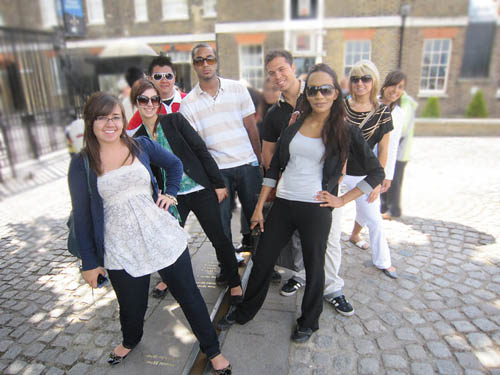
Those planes arcing one by one into the sky beyond George Bragues’s office window provide a perfect backdrop for his topic. He heads a growing roster of study-abroad programs offered at the University of Guelph-Humber, whose home base is located practically within view of Toronto’s Pearson International Airport.
Programs with a global flavour are nothing new to students at the University of Guelph. Through study-abroad semesters involving U of G’s Centre for International Programs, Guelph students have visited such destinations as Paris, London and India.
Such programs are still a novelty at Guelph-Humber. Here, the first-ever trip in 2010 took 10 business students to London’s financial district.
But as Guelph-Humber celebrates its 10th anniversary this fall, the school is quickly growing its study-abroad menu to help widen the international element of its curriculum. In the process, it’s also exploring a few destinations other than those offered through U of G.
This year, Guelph-Humber students added stamps to their passports during study-abroad trips to London and New York City, Sweden, Ireland, Argentina and Italy.
Rather than take an entire semester, as with several U of G trips, the Guelph-Humber jaunts last for 10 to 12 days.
Broadening students’ horizons is one goal, says Bragues, G-H assistant vice-provost and head of the school’s business program. For many students, it’s their first time outside of Canada or overseas.
The trips are also intended to complement in-class studies. “The first study-abroad course was London as a finance centre,” Brague says.
In spring 2010, a group of business students visited RBC Capital Markets, the London Metals Exchange and Lloyd’s of London. They also took in cultural landmarks such as the Tower of London and British Museum.
That inaugural trip led student Kirth Ramoutar to move to Europe after graduation in 2011.
Says Ramoutar: “Through the exchange, I found myself a lifestyle that I found suited me better, established networks and connections.” He began a master’s program in international communications at Hanze University in the Netherlands this fall.
This year, media studies students paid a dual-track visit to media centres in New York and London. Other students visited Ireland, Argentina and Sweden.
Prof. Glenn Hanna, assistant head of the justice studies program, led a group this past spring to Dublin and Belfast. Visiting Northern Ireland’s police service was especially memorable for Shannon Jamieson, who will begin her final year in Guelph-Humber’s justice studies program this fall.
Referring to decades of political conflict and violence that ended with the Good Friday Agreement of 1998, Jamieson says, “We had the chance to meet with members of the community that were from both sides of the conflict. The most interesting part was that the community groups that were pushing and working towards peace were made up of former paramilitary members, and some had even been in prison for paramilitary crimes before the Good Friday Agreement released them. This is actually what I focused on for my research paper.”
Meeting the “locals” – especially in the local pubs – was another benefit, she adds.
Bragues says there’s another goal for Guelph-Humber’s study-abroad program: to help open eyes and minds to the unknown.
That’s what he had in mind in 2011 and this past spring during study-abroad visits to Italy. Commerce plays in – he is a business professor after all – but so does culture.
“The cultural explosion of the Renaissance was fuelled by economic growth,” says Bragues, whose “Renaissance, Culture and Commerce” course took in Rome and Florence.
He says international travel encourages students to appreciate that people do things differently in other places – eurozone financial woes and all.
He’s mulling over a course in Spain or Portugal for next year. That trip would involve the history of commerce, including colonization of the Americas and European forays into Asia. “It would be a good opportunity to explore the European crisis,” says Bragues, who saw evidence of an economic slowdown in Portugal during a family trip there earlier this year.
He’d also been to Italy before, but he enjoyed viewing the country through students’ eyes.
“My favourite moments are when I see students get excited about what they’re seeing.” Whether it’s Boticelli’s Birth of Venus in the Uffizi Museum in Florence or the Roman Coliseum, he says, “I also like to see their sense of astonishment and wonder.”
His goal is to line up study-abroad trips for each of Guelph-Humber’s seven academic programs.
Bragues says the study-abroad program is just one element of a push to widen the school’s international curriculum. Professors have visited Guelph-Humber from elsewhere, and G-H faculty members have reciprocated.
He spent a week teaching at a business school in San Andreas, Argentina, for instance, and has entertained his Argentinian counterpart here. They’re now looking at adding San Andreas to the study-abroad itinerary for media studies students.
Learn more:
Study-abroad programs will share the spotlight with Guelph-Humber’s seven degree programs during the university’s 10th-anniversary open house Oct. 13 from 10 a.m. to 4 p.m. The day will include tours, family activities, food and entertainment. Guelph-Humber is located at 207 Humber College Boulevard, Toronto. For a full schedule of events, visit celebrate.guelphhumber.ca/openhouse.
Click here for a review of the University of Guelph-Humber’s first decade.